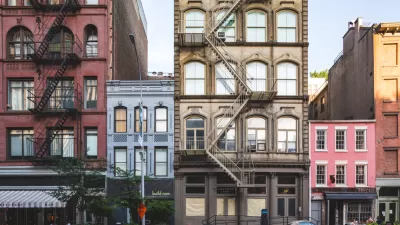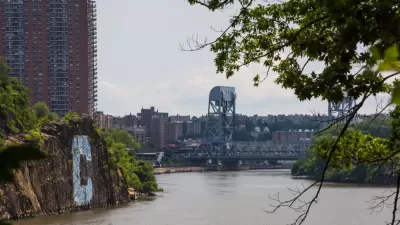The Renaissance Revival building that houses New York City's beloved Strand Bookstore is under consideration by the city's Landmarks Preservation Commission. The case has provoked debate between rival advocates.

"Since vacating 4th Avenue's legendary 'Book Row'—of which it is the only surviving store—in 1957, the Strand has blossomed into an adored cultural institution," Jack Denton writes. "Though colossal gentrification, the rise of Amazon, and various other bookseller-unfriendly forces have felled many other nearby stores, the Strand has remained."
Recently, a proposal from New York's Landmarks Preservation Commission to landmark the exterior of the Strand's building has provoked pushback. "Landmarking will limit the store's ability to make renovations, creating bureaucratic costs for the store's continued existence, the Strand and its supporters argue."
"In some ways, the owner of a for-profit business—albeit a culturally beloved one—fighting the city's proposed regulations on its building is a dog-bites-man story. However, the Strand's story also reflects a growing anti-landmarking coalition that views preservation initiatives as potentially harmful to the historic and culturally significant neighborhoods and buildings they intend to preserve."
Denton goes on to discuss the many angles from which advocates approach the desirability of landmarking. YIMBYs, for instance, oppose what they view as an imposition to new construction. Some anti-gentrification advocates dislike the practice because it can lead to higher perceived neighborhood desirability. Others see it as a way to fight rampant redevelopment. "In New York, landmarking of neighborhoods tends to raise housing costs in the outer boroughs, but not in already dense and expensive Manhattan, where the effect of landmarking on housing prices is small," Denton writes.
While some advocates suggest "pairing historic preservation initiatives with plans for adding affordable housing or easing zoning restrictions outside the landmarked district," to do so "would require the cooperation of multiple independent city agencies that may not be in communication—and which might have rival priorities."
FULL STORY: Is Landmarking a Tool of Gentrification or a Bulwark Against It?

Planetizen Federal Action Tracker
A weekly monitor of how Trump’s orders and actions are impacting planners and planning in America.

Maui's Vacation Rental Debate Turns Ugly
Verbal attacks, misinformation campaigns and fistfights plague a high-stakes debate to convert thousands of vacation rentals into long-term housing.

San Francisco Suspends Traffic Calming Amidst Record Deaths
Citing “a challenging fiscal landscape,” the city will cease the program on the heels of 42 traffic deaths, including 24 pedestrians.

Defunct Pittsburgh Power Plant to Become Residential Tower
A decommissioned steam heat plant will be redeveloped into almost 100 affordable housing units.

Trump Prompts Restructuring of Transportation Research Board in “Unprecedented Overreach”
The TRB has eliminated more than half of its committees including those focused on climate, equity, and cities.

Amtrak Rolls Out New Orleans to Alabama “Mardi Gras” Train
The new service will operate morning and evening departures between Mobile and New Orleans.
Urban Design for Planners 1: Software Tools
This six-course series explores essential urban design concepts using open source software and equips planners with the tools they need to participate fully in the urban design process.
Planning for Universal Design
Learn the tools for implementing Universal Design in planning regulations.
Heyer Gruel & Associates PA
JM Goldson LLC
Custer County Colorado
City of Camden Redevelopment Agency
City of Astoria
Transportation Research & Education Center (TREC) at Portland State University
Jefferson Parish Government
Camden Redevelopment Agency
City of Claremont




























